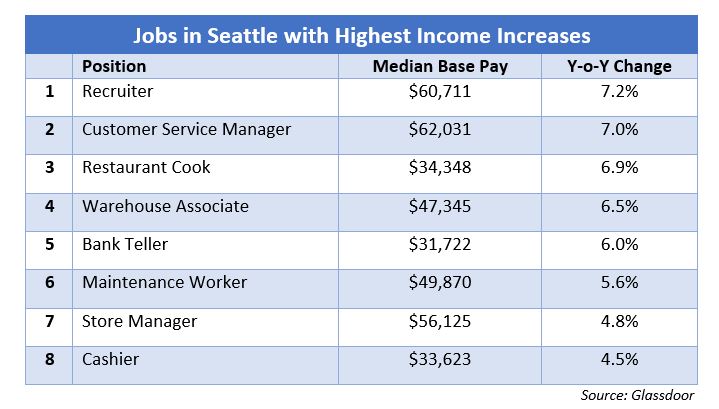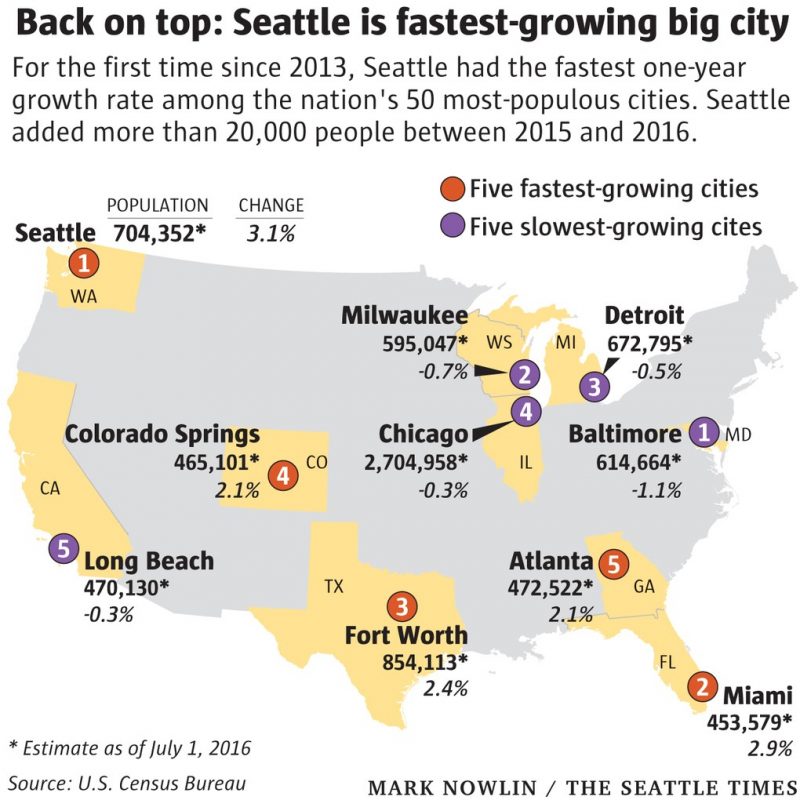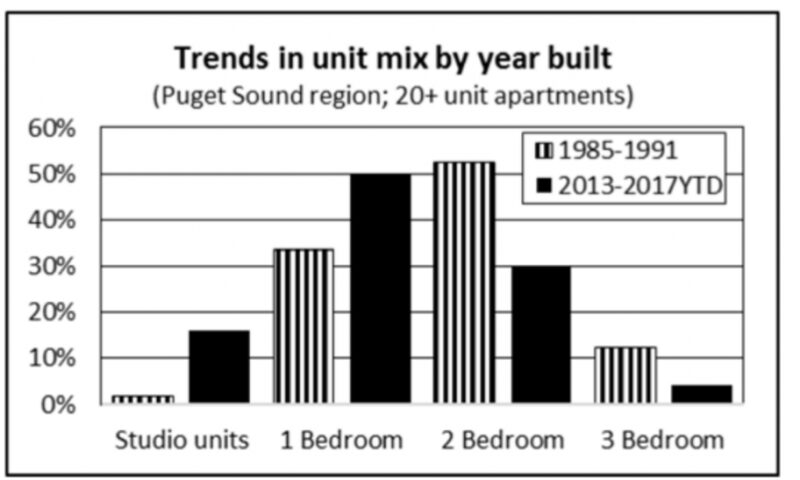The Great: Seattle Salaries Rising
Glassdoor recently released their Local Pay Report, and surprise, surprise: Seattle median salaries are growing across the board! Seattle’s median salary is 14 percent higher than the national average, and high-wage, in-demand positions like software engineer and data analyst are seeing steady salary increases year-over-year.
Increases in tech salaries make sense as companies like Google set their sights on more aggressive hiring in Seattle: Google reports that it’s now easier to attract talent to Seattle than to San Francisco because the cost of living here is lower (for the moment).
The positions with the highest salary increases offer the most encouragement, however, because they’re predominantly roles in the service and retail industries. Higher salaries for software engineers and programmers means salary growth for the rest of Seattle, too, which strengthens our economy long-term:

The Good: Seattle as Fastest-Growing Big City
Seattle is the fastest-growing city in the country for the second time since 2010, with an average of 57 people moving here daily. Developers and employers read this statistic with glee, but commuters might read it with some trepidation: more people on I-5 in the morning? No thank you!

The growing population is good for the economy on a macro level, but count on it having a big impact on everyone’s lifestyle, too. Even within the urban core, people will start choosing their housing by triangulating between where they work and where they want to spend their weekends, because the threat of hours in traffic is too daunting.
In turn, more micro neighborhoods with retail cores will emerge to accommodate people who want to brunch, work out, run errands, shop, and go out within a three-mile radius of their front door. Investors should consider the amenities that surround a property before investing because the residents sure are! Developers should also keep walkability and livability in mind when constructing new buildings; people want to live where they feel connected and comfortable walking out their front door.
Finally, having the title of “Fastest-Growing City in America” means transit will matter more than ever (and it already mattered quite a bit too many disgruntled commuters!). Transit will begin to play as big a factor in housing decisions as rent and square footage already do.
Apartment owners already living in transit-dense neighborhoods have an opportunity to raise rents, and any land or houses along transit lines will see skyrocketing sale prices as developers try to beat the gold rush. Planned developments are already clustering around the future light rail stations, and the trend will keep following ST3 north and east.
The Worrisome: Puget Sound Housing Prices Setting Records
For every person who’s considering purchasing a home in the next two, five, or even seven years, this trend is worrisome, indeed. The Seattle Times recently reported that records have been set in King, Snohomish, Pierce, and Kitsap county, meaning Seattleites will either have to keep renting or move much further out in order to find a house under $500,000.
For developers and investors, these rising prices could have different implications. If more families are forced to rent instead of buy, demand could increase for larger units within Seattle’s urban core. This demand hasn’t arrived yet, or it’s been overshadowed by the influx of single, high-income renters in need of studios or one bedroom units:

These larger units are unlikely to start appearing in new high-rises or new 50+ buildings any time soon, however. They are more expensive to build, and vacancies in larger units are tougher to fill. But owners of existing buildings with 2- and 3-bedroom units may have room to push rents in the next few years.
Rising housing prices could also accelerate the movement of residents out of the core and into suburban markets as they seek out yards and fences for their families… even if they’re still renting.
Red Flag: Seattle’s Dependency on Amazon
Not quite worrisome, but it’s something to keep in mind! Seattle relies heavily on the success of Amazon, and with good reason: the internet company has dramatically reshaped Seattle’s economy and landscape over the last decade, and it’s set to continue redefining our future for at least a decade to come. The company attracted literally thousands of new, high-wage employees to the area, and other tech employers have followed the talent and set up shop. They’ve brought the good: higher salaries, and investments in Seattle’s infrastructure, for example. They’ve also brought the not so good: increased traffic in South Lake Union and the mythical “Amazon bro” who haunts Capitol Hill on weekends.
Some worry that Seattle relies too heavily on Amazon – if the company went under in the next five years, the city would be hit hard. But a collapse of this magnitude is hard to envision, especially following a week when Amazon’s shares broke $1,000 for the first time ever.
2017 is nearly halfway gone, and Seattle is already on pace for another record-setting year of growth! Keep your eyes trained on the Puget Sound region’s employment growth in the second half of the year, and our team will continue to deliver market insights about apartment demand, rent & vacancy trends, sales metrics and more to your inbox!

